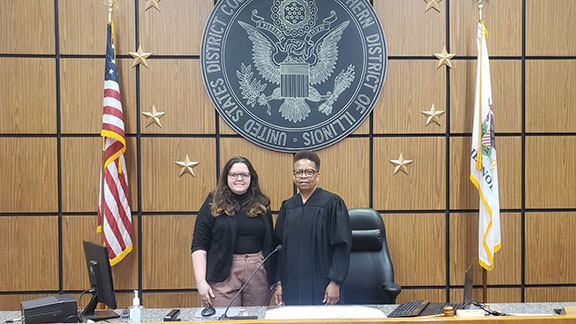by Pete Rosenbery
CARBONDALE, Ill. — Working with the federal public defender’s office for the Southern District of Illinois is the perfect fit for third-year Southern Illinois University Carbondale School of Law student Rachel C. Burke.

The law school’s Metro East Criminal Justice Experiential Learning Program is giving Burke the opportunity to focus on issues she is most passionate about.
“I was excited to get a chance to actually work in the federal criminal justice system, especially as a defense attorney. I am also really excited to get exposed to the problem-solving courts. I’m a big supporter of restorative justice,” said Burke, who works out of the Federal Public Defender’s office in Benton, Illinois, this semester. Burke will also do her academic honors capstone project on restorative justice.
“I have always gravitated toward criminal law, and getting to interact with defendants, families of the defendants, prosecutors, defense attorneys, probation officers and judges has really given me a lot of perspective on both the legal field and people in general,” said Burke, who grew up “all over” the Chicago suburbs and was living in the Cook County village of Justice during high school.
“The attorneys here are incredibly kind and very smart. They are really good teachers, and they have given me some really good opportunities to contribute and feedback on my performance that has been positive and also really helpful in shaping me into the kind of attorney I want to be.”
Applied legal education
As the SIU School of Law celebrates its 50th anniversary in 2023 with its long-held emphasis on experiential education, it remains the only public law school within about two hours of Belleville and the Metro East and 40 minutes from the federal courthouse in Benton. The program was announced in August 2022 and is being offered during the fall semester.
Shelly Page, associate professor and experiential education program director, said the emphasis on “learning through practical experience and reflection has become an integral part of legal education,” though its history can be traced back to the 19th and early 20th centuries when “legal education began to evolve from a purely theoretical doctrinal approach to a more practical and skills-based approach.”
Rewarding experiences with a busy schedule
In addition to her work Monday through Thursday in Benton, Burke has visited specialty courts in Edwardsville, Belleville and East St. Louis. Those include veterans and service members treatment court, domestic violence court, mental health court, teen court and drug court. She balances that with a sports law class that meets two nights a week.
“Overall, though, I think these sacrifices right now are worth it to get the experience that I am getting,” Burke said.
Under Supreme Court Rule 711, Burke is able to make court appearances on the record. In her work at the Federal Public Defender’s office, she is able to draft objections to presentence reports along with several sentencing memos and contribute to an “ongoing research project regarding new Supreme Court precedents.”
Gaining confidence
Burke added the experience also carries tangible benefits she will use as an attorney, including being comfortable in a courtroom or talking to attorneys and knowing that she can contribute to the legal profession.
“The most confidence-building experience is when another real-life attorney asks me for my input,” she said. “I feel so much more comfortable actually talking to professionals in the field, and I feel like I truly belong here. It’s nice to kind of solidify in your head that you are doing the right thing career-wise because a law degree is a significant investment, and it’s nice to know that it will be worth it in the end.”
Burke graduated from Blackburn College in Carlinville, Illinois, with a double major in political science and legal studies and a minor in Spanish. She received a full-ride scholarship to attend law school. The law school’s professors “really care about the students and their development as professionals in the field.”
The internship exposes students to all facets of criminal law, she said. She gained insight into the federal prison system and defendants’ rights, and met both public defenders and prosecutors who “no doubt would have a lot to teach.” The court system is not all punitive, she said.
“It is really nice to see the good side, the rehabilitative side of the criminal justice system,” Burke said. “Specialty courts like these are not available everywhere yet, and being a part of this externship course has given me a firsthand sight of these programs, which has sparked all kinds of ideas in my head for how I want to contribute to society in the future.”
Called to public service
Burke wants to continue to work in public service because it’s her “true calling.” She has applied for a fellowship with a Chicago nonprofit organization, where one of the focuses is researching “legal and policy strategies for police reform and community-based alternatives to incarceration, which is exactly what I’m doing now in this internship.” She also plans to apply for state public defender positions in central and Southern Illinois and the Metro East.
